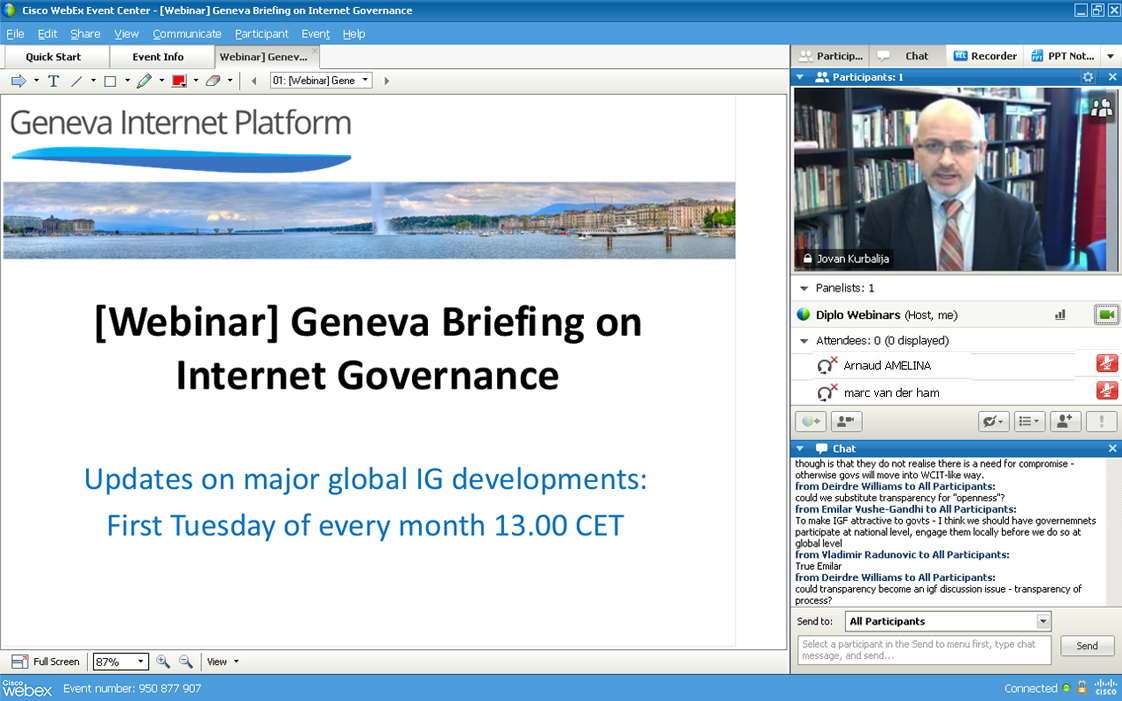[Briefing #5] Internet governance in May 2014
To assist diplomats in grasping the complexity of this multidisciplinary and multistakeholder political environment, and to bring them up to speed on what to follow, when to follow it, and how to follow it, the Geneva Internet Platform (GIP), operated by DiploFoundation, offers a monthly Geneva Briefing on Internet Governance, besides other activities. The briefing webinars take place online on the first Tuesday of every month at 13:00 hrs (CET). Each briefing discusses the main developments in the previous month and looks at those envisaged along with global events scheduled for the coming month. Next briefing will take place in September.
At the May webinar, we focused mainly on the NETmundial process and the associated outcomes and reflections. We also touched on the IANA transition process and the European Parliament’s decision with regard to network neutrality. We then reflected on other relevant events such as the ITU World Telecommunication Development Conference 2014 and the Freedom Online Conference.
Our June Geneva Briefing was conducted as a blend of our ‘traditional’ online webinar that gathered over 20 participants, and a physical gathering of dozens of diplomats and professionals at the GIP premises in Geneva. Dr Jovan Kurbalija, the GIP director, reflected on several key developments from May.
The turbulence within ICANN continued after its rejection of the application for the new generic Top Level Domain (new gTLD) .amazon following a consensus-based request from the Government Advisory Committee (GAC). While this has restored some of GAC’s confidence in the ICANN multistakeholder system, the emerging disagreements over .wine and .vin domains may be the next big challenge.
Net neutrality remains on the stage. After the European Parliament adopted the Regulation on the Single Telecoms Market with strong net neutrality provisions which we discussed in May, the United States Federal Communications Commission (FCC) proposed rules about the future of the ‘Open Internet’. Both the US and the EU trends may impact the decisions as well as the economy of developing countries.
Several other (un)expected developments shook the IG discussion arena. The European Court of Justice ruled that Google has to amend search results to exclude ‘outdated’ and ‘irrelevant’ personal data – a case referred to as the Right to be forgotten. At the same time, the USA and China continued their mutual accusations with regard to cyber-espionage – this time the verbal battle ended with both parties suspending activities of the China-US Cyber Working Group.
The expected developments started with the final report from ICANN’s Panel on Global Internet Cooperation and Governance Mechanisms, which brings key recommendations on how to evolve IG ecosystem. The CSTD Working Group on Enhanced Cooperation ended up with a stalemate on ‘roles and responsibilities’, while the IGF Multistakeholder Advisory Group meeting that took place in Paris (re)opened discussions on producing more tangible outcomes from the IGF, in the form of a Chairman’s Summary, best practices, or even an outcome documents developed following an (improved) NETmundial model. The preparations for the WSIS+10 High Level Event were in full swing drafting the WSIS+10 output documents, while the Stockholm Internet Freedom had a strong focus on discussing whether or not surveillance is an Internet governance issue.
The myriad of events and developments – especially NETmundial – impacted the positions of main IG actors: various governments, the corporate sector, civil society, and the technical community. Dr Kurbalija briefly analysed this ‘repositioning’ and provided examples of differences in positions using the example of net neutrality debates in the USA.
The GIP was active in May as well, with a presentation of the book Peacetime Regime for State Activities in Cyberspace with the NATO Cooperative Cyber Defence Centre of Excellence, and a workshop on Diplomatic Reporting in the Internet Era.
The briefing also looked at the main events scheduled for June:
- WSIS+10 High Level Event: 10-13 June in Geneva
- EuroDIG: 12-13 June in Berlin
- ICANN50 Meeting: 22-26 June in London
It was announced that GIP would be particularly active in June with a number of events:
- The role of governments in Internet governance panel on 12 June
- Bitcoin and other cryptocurrencies discussion on 13 June
- Internet as a Critical Resource for Pacific Island States on 18 June
- The fight for Net Neutrality online webinar on 30 June.
The briefing ended with a round of comments and interesting discussions on upcoming developments, the multistakeholder model in IG, and territoriality in cyber-space.
|full_html

